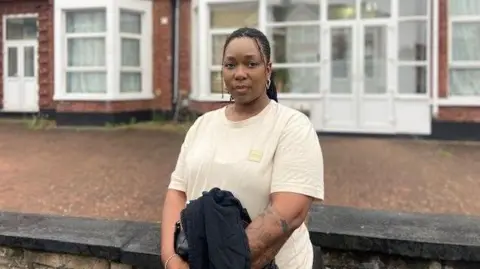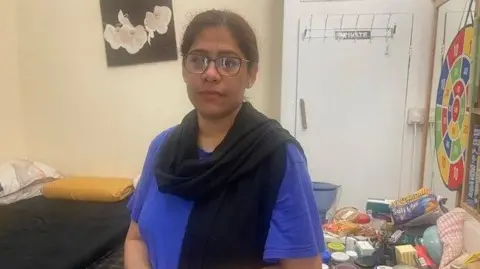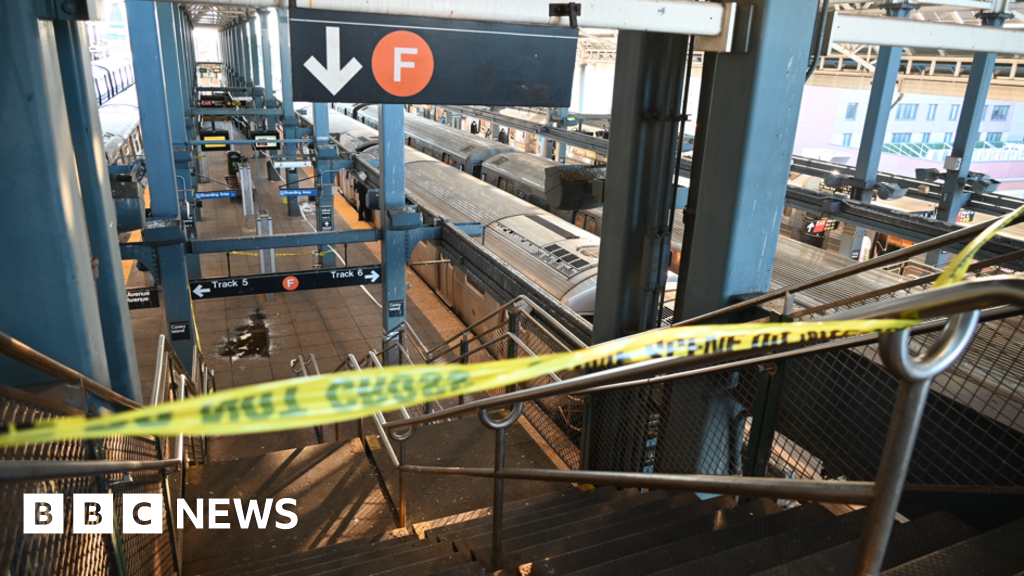
 BBC
BBC
Five-year-old Habibah wishes she had more space to play
On the first floor of the Willow Lodge guest house, Habibah and her brother Hameef are jumping around in the cramped bedroom they share with their mother. They dodge the stacked suitcases, the two beds, the small table and the fridge as best they can, but they barely have room to move.
“We need a bigger space,” says five-year-old Habibah. This small double room in east London, with its attached bathroom, has been the family’s home for seven months, and Habibah has had enough.
“We need a good big space for me and my brother [to play], and there’s no sofa like the old house [had].”
“Whenever she's playing with her toys,” says her mother, Jamaanu, “if the food is ready, she has to put them back again because we don't have a dining table. We sit on the floor, outside the toilet, and eat our food.”
Although this room is described as temporary accommodation, the family have no idea how long they’ll be here. This uncertainty means that Habibah still attends the same school, even though it is now two buses and an hour away.
Like many others living in this block, the family were victims of a section 21 “no-fault” eviction, where a landlord can ask someone to leave at short notice without giving a reason. The measure is described by charities as a key driver of homelessness, as tenants often find they can no longer afford to rent privately at current market rates.
No-fault evictions increased by 30% in April to June compared with a year earlier, despite the previous government’s longstanding pledge to ban them.
From next summer, the government says, landlords will have to give families like these a longer notice period before eviction and also provide a valid reason such as wanting to move in themselves.


Romel Peters was served a no-fault eviction and had been told she would be housed
But for the London borough of Redbridge, which is paying for the Willow Lodge families, the current situation is crippling.
It’s a similar picture for many other local authorities, who are spending a huge chunk of their budgets providing temporary accommodation.
In the next, smaller, room are Romel Peters and her two sons. They’ve been here for 15 months. They too were made homeless after a no-fault eviction. The family looked for a different flat but Romel says a private two-bed property would cost £1,600 a month, which she says is unaffordable.
The two boys, aged seven and eight, share a double bed while Romel has a single bed beside them. “We eat, sleep, play, wash, bathe, brush teeth, everything in this room,” says the 37-year-old. But maybe not for much longer.
Redbridge Council wants the family to move to different temporary accommodation, three hours away in West Bromwich, in the west Midlands. She declined.
“I'm from Redbridge, all my family's here,“ she explains.
"Everything I know, everything my children know, is in Redbridge. If we move three hours away, we have nothing. We have no support, no friends, no-one to have regular contact with.”
The council says her refusal to move means she’s made herself intentionally homeless and so it no longer has a duty to help the family. They must leave Willow Lodge in three days’ time.
Redbridge Council told the BBC that alongside the offer of alternative accommodation in the Midlands, it had offered her support to find employment and school places.
While Willow Lodge is at least close to Romel’s support network, residents say they have had a number of issues with the property including cockroaches in the cupboards, as well as an infestation of bedbugs and mice in recent months.
There are two four-ring hobs in the kitchen but only one of them works, they say, while the door of the microwave is broken.
Despite the challenges, there are often queues to use the facilities – there are at least 20 people, including 12 children living at the property. They can’t however use the kitchen after 10pm, while they say the only washing machine is out of bounds after 5pm.
The residents say the landlord receives between £400 and £800 a month for each room depending on its size.


Saina says she is grateful the UK has taken her and her son in
A Redbridge Council spokesperson told the BBC it expects all landlords to provide accommodation of an acceptable standard and in this case would urgently inspect the premises and speak to the tenants about their concerns.
It added that it would expect the landlord to work with the council to urgently carry out any necessary remedial works.
The BBC attempted to contact the landlord for comment through the council but has not received a response.
Alongside higher rates of no-fault evictions and increased rents, cost of living pressures and immigration have created a perfect storm for the temporary accommodation system.
Councils in England spent more than £1bn on temporary accommodation in 2023-24, an increase of more than 50% on the year before. The costs were driven by a record 117,450 households in short-term housing, including more than 150,000 children.
Redbridge Council says it spent £52m on temporary accommodation last year, a figure they describe as “staggering” and “simply unsustainable”.
“The stark reality is that we can no longer afford to keep people in temporary accommodation due to London’s exorbitant private rental market,” the council said.
Three days later and it is eviction day for Romel Peters. But first she has to take her sons to school - she’s decided not to tell them they might not be coming back here.
“I didn’t want to create worry. They’ve literally just started back at school, so I want them to focus on settling in.” Her own stress levels however are “through the roof. I haven’t slept".
As Romel goes back inside the guest house, other residents emerge. They have ended up here for a variety of reasons.
One woman, aged 65, says she’s been in Willow Lodge for three years, while the residents of two other rooms have been sent here by the Home Office.
The two families, a Sudanese man with two children and a woman from Pakistan with a 10-year-old-son, have recently been given the right to remain in the UK after having their asylum applications accepted.
Saina, from Islamabad, says she’s grateful the country has taken them in. She doesn’t know anyone in the UK and would move anywhere they could “start their lives” as long as her son continues to receive counselling for his mental health problems.
Hours before she is due to leave, Romel Peters receives a call from Redbridge Council. They have had a substantial change of heart and are hopeful of being able to help her find a permanent two-bed property in the area within a few days.
“I’m relieved. It’s frustrating that it’s taken this long to get the support but I’m looking forward to the future,” she says as she brings her boys home from school and tells them the happy news.
But a week later, Romel and her sons are homeless, forced to sofa-surf with family members. The council has stopped paying for their stay at Willow Lodge - and its offer to help find a new home hasn’t yet come to anything. The uncertainty of homelessness continues, and like thousands of other families across England, it all started with a no-fault eviction.

 3 months ago
23
3 months ago
23









